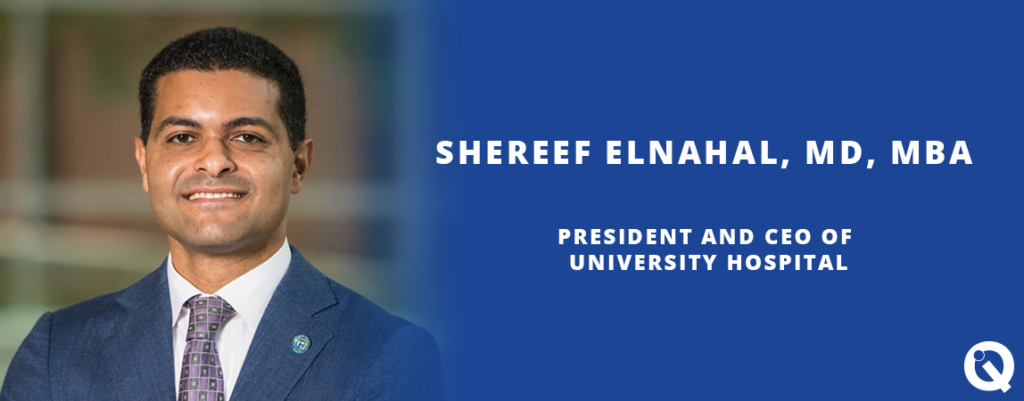Shereef Elnahal, MD, MBA, is the President and CEO of University Hospital in Newark, NJ, a member of the Quality Institute. He is also the newest member of our Board of Directors.
As CEO of University Hospital in Newark, what are the top priorities you’ve identified for improving quality and patient safety for 2020?
At University Hospital, we’re focused on the environment of care and really on specific domains, such as infection control and process improvements, and making sure folks get the right care at the right time for things like medication management. But also safety and environment of care issues around things like patient falls and process issues that are germane to outcomes, such as pressure ulcers.
Our focus is on preventable problems in the hospital. We’re squarely focused on making sure that our staff members implement the right protocols. I will say that coming in here, the quality of the clinical decision making by our physicians and nurses, and really every clinician, is top notch. But it’s all about the execution of those decisions — where the rubber meets the road with the patients. That’s where we’re focused on protocols and care initiatives to improve the care environment around patients.
Previously you were Commissioner of the New Jersey Department of Health. How did that specific experience prepare you for running a hospital?
It gave me a unique lens into statewide trends in the market. Part of my role as Commissioner was reviewing the financial health of hospitals across the state and providing feedback through to every hospital. And I did focus on those hospitals that were at particular risk of closing; monitoring their financial condition until resolutions were put in place. We did that with Salem and supported the management team until they successfully completed a sale. Part of your role as Commissioner is ensuring access to care, and that is an essential piece of public health. I also got an up close and personal look at all of the state regulations that govern things like quality, safety, staffing ratios, etc., to which I’m being held to account right now. All of that was a helpful experience.
You recently joined the Quality Institute’s Board of Directors. What attracted you to working more closely with the Quality Institute?
I appreciate the Quality Institute’s focus on inpatient quality care and patient safety — and I was honored the board asked me to join. Quality has been a focus of mine, starting when I was a resident and received training at the Armstrong Institute for Patient Safety and Quality and also when I was basically the chief quality officer for the U.S. Veterans Administration.
The Quality Institute is the regional leader of Leapfrog…but you also focus on macro state level policies that affect the health care system. I appreciate the opportunity to continue contributing to the evolution of health care policy in New Jersey.
As Commissioner, you were very supportive of expanding the medical marijuana program. What work have you done at University Hospital to prepare the hospital to work with medical marijuana patients?
We are right now exploring the possibility of accommodating the self-administration of medical marijuana for patients admitted to the hospital. Let’s say somebody is on medical marijuana for chronic pain. We would hate to prevent that patient from taking something we know already works for their pain and instead start a much more dangerous medication, like an opioid.
I was very involved in the Murphy Administration’s goals to reduce opioid prescribing, and I’ve taken it as a badge of pride that already at University Hospital that we’ve reduced opioid prescribing. Medical marijuana is another tool in the toolbox for reducing opioids. But it’s complicated. We are largely dependent on federal funding as most safety net hospitals are, so what we really need to do is make sure that we’re managing our risk. And so, we haven’t implemented a medical marijuana policy yet. We have to work out some operational details first.
Sometimes we ask people to tell us something about their life beyond their professional focus. Imagine that you are not at work and your phone is off. Where would we find you?
When I can get away, I first and foremost spend time with my family. I am married and I have two children with one on the way, which is a blessing, but of course makes things busy at home in a good way. So, spending time with my family takes precedent over really everything else outside of work. When I do get time to do other things, I play guitar, electric bass, and I also play tennis. These things allow me to decompress, but being part of a young, growing family has been a tremendous blessing.

